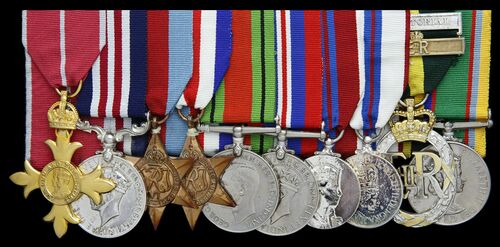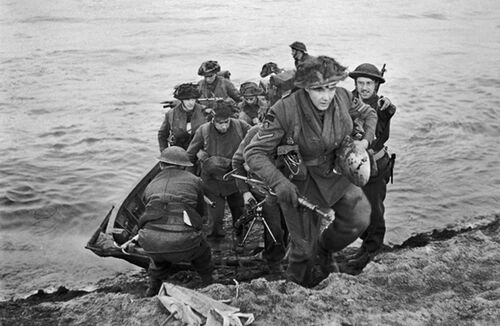Auction: 24001 - Orders, Decorations and Medals
Lot: 159
A fine post-war O.B.E., Second World War Operation "Plunder" immediate M.M. group of ten awarded to Brigadier J. Brown, Royal Engineers, afterwards a long-served officer of the Territorial Army and Commandant of the Army Cadet Force in Scotland
Having come ashore in the early hours of D-Day and cleared mines and obstacles from Sword beach, he piloted a stormboat at the crossing of the Rhine in March 1945, when he carried out a daring rescue under heavy fire
The Most Excellent Order of the British Empire, Military Division, Officer's (O.B.E.) breast Badge, silver-gilt; Military Medal, G.VI.R. (14504308 A. Cpl. J. Brown. R.E.) 1939-45 Star; France and Germany Star; Defence and War Medals 1939-45; Coronation 1953; Jubilee 1977, copy; Efficiency Decoration, Territorial, E.II.R., the reverse dated 1956, with Additional Service Bar; Cadet Forces Long Service, E.II.R. (Col J Brown MM TD ACF), mounted court-style as worn, good very fine (10)
O.B.E. London Gazette 31 December 1985. The original recommendation states:
'After distinguished wartime service Brigadier Brown served in the Territorial Army for 17 years and commanded 80th (Scottish) Port Regiment, Royal Engineers. For 13 years he commanded the City of Glasgow Battalion, Army Cadet Force and raised it to the highest standards of efficiency. Under his command the Battalion had an enviable reputation throughout the United Kingdom and consistently won the premier awards for Cadet shooting.
Since April 1981 he has been Commandant of the Army Cadet Force in Scotland and Chairman of the Army Cadet Force Association Scotland. In these appointments he has shown selfless dedication and is admired throughout Scotland for his efforts to improve efficiency and well-being of the Cadet movement. His advice is frequently sought by Formation Commanders and County Cadet Commandants. He achieved the smooth reorganisation and amalgamation of 10 Battalions over widespread regimental areas using great powers of tact and diplomacy.
He is tireless in working for the cadet movement and gives freely of his time, much beyond the calls of public duty and public voluntary service. Brigadier Brown's outstanding contribution to the Army Cadet Force in Scotland richly merits recognition.'
M.M. London Gazette 12 July 1945. The original recommendation states:
'On 24 March 1945, at first light, Lance-Corporal Brown was Pilot of a Stormboat which assaulted across the Rhine at Vynen. The boats came under heavy fire of rifles and machine-guns on their run downstream and across, which caused heavy loss.
Lance-Corporal Brown pressed on and disembarked his infantry, then hearing a call for help from a Weasel driver, whose craft had been sunk, he set out and went to the rescue. Under intense fire he made three separate efforts to secure the man before succeeding and bringing him to the near bank.
Lance-Corporal Brown showed great courage and determination in saving this man at the very great risk to his own life.'
John Brown was born in Glasgow on 25 November 1923 and attended Hutchesons' Grammar School before volunteering for the Royal Engineers.
By the eve of the Normandy landings in June 1944, he was serving as a Lance-Corporal in No. 9 (White Horse) Squadron, R.E., and it was in this capacity that he came ashore in the early hours of D-Day to clear mines and obstacles from Sword beach. In the words of his obituary in The Glasgow Herald, 'it was a highly dangerous mission' and Brown became one of a handful of survivors: so severe were the casualties that his unit was disbanded.
He subsequently joined No. 629 Field Squadron, R.E., and it was in this capacity that he was awarded his immediate M.M. for the crossing of the Rhine on 24 March 1945.
After the war, Brown joined the confectioners Bassett's and rose to be area manager for Scotland and Northern Ireland. As cited in the recommendation for his O.B.E., however, he also served for many years as a member of the Territorial Army and as a senior officer of the Army Cadet Force in Scotland. He finally retired in the rank of Brigadier in 1985.
Moreover, as recounted in his obituary notice, 'his commitment did not end there. For a number of years he almost single-handedly organised the Scottish Poppy Appeal on Glasgow's south side, assuming the whole city area's Chairmanship in 2002. He was also appointed a Deputy Lord Lieutenant for Renfrewshire.' The Brigadier, who was blessed with a dry sense of humour, died in November 2008.
Subject to 20% VAT on Buyer’s Premium. For more information please view Terms and Conditions for Buyers.
Sold for
£3,000
Starting price
£1600







